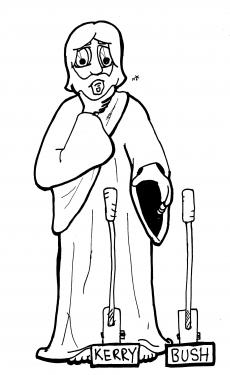Opinion column: In God we trust

Illustration Illustration
Sep 1, 2004
A lot of conservative Christians I know have a tendency to see everything, at least politically speaking, in black and white – perhaps because religion has a way of reducing a person’s view of the world into simpler terms. Once religion enters the picture, especially a religion that has all its moral codes written down in the Bible, it somehow becomes clearer that whoever breaks those codes must be shunned and whoever obeys them deserves support and applause. But unfortunately, the world isn’t that simple. There’s a lot of gray out there, and sometimes it can’t all be neatly categorized into good or evil.
President Bush, for example, can’t be neatly categorized this way. Like everyone else, he has both good intentions and faults. Hopefully, Christian voters know this. Hopefully, they will look beyond the surface and take the gray into account when they vote in the upcoming presidential election. After all, Christian votes will have a huge influence on the outcome of the election. In fact, around 76 percent of the total U.S. population claims to be Christian.
I have a Christian friend who isn’t exactly involved in politics. But despite this, she has no qualms over who to vote for. “Bush is a Christian and follows Christian principles and Kerry doesn’t. That’s all I need to know.”
But is it? Although I’m sure Bush is aware his religious rhetoric is helping win loyalty among the conservative and/or Christian voting public, I don’t question his intentions as a Christian. I think Bush firmly believes he was called by God to lead his country.
But would God really call upon a man to lead who initiated a war that has killed thousands of innocent Iraqi civilians, not to mention hundreds of U.S. troops? There’s another qualification to becoming the chief executive of the country besides morality: competency. A war should not be started, and thousands of people should not be killed, unless we are left with no other option. It is still debatable whether circumstantial links between Iraq and al-
Get The Daily Illini in your inbox!
Qaida and suspected weapons of mass destruction are sufficient reasons to start a war.
It makes sense Christians would want to support a president whose stance on the issues is in accordance with Biblical principles of morality. Like the majority of Christians, Bush fights against abortion and believes same-sex marriage would corrupt the sanctity of traditional marriage. But the president’s foreign policy is just as important as his stance on the issues. Christians need to consider how Bush’s policies have affected the rest of the world’s view of Christians living in the United States, and how that view will also affect our country’s future. In his typical simplifying manner, Bush repeatedly has described the war on terrorism as a war of good vs. evil. But does the rest of the world agree on who is good and who is evil?
Voters face a similar danger of simplifying the election if they consider President Bush as good and Sen. John Kerry as evil.
This isn’t to say John Kerry represents Christian morals, either. Not only does he oppose typical Christian views on issues such as abortion and same-sex rights, but apparently his fellow sailors and officers in Vietnam felt compelled to condemn him as a coward and a liar. In a new book, “Unfit for Command,” they claim Kerry’s military awards and record are based on lies.
In reality, neither candidate is a perfect model of Christian virtue. The important thing for conservative Christian voters to remember is not to trust Bush as the best man for the job, simply because of his professed faith, without considering his ability and track record. Just because President Bush claims to be a Christian doesn’t mean he acts as a Christian should, and just because he is a Christian doesn’t necessarily mean he’s “fit for command,” either.
Cassie Cleary is a sophomore in LAS. Her column runs Wednesdays. She can be reached at [email protected].





